小学一般疑问句
小学英语 一般疑问句

小学英语讲义一般疑问句一般疑问句一般疑问句:它是指用yes或no来回答的句子。
其结构是:系动词be/助动词/情态动词+主语+其他成分?一、含有be动词的陈述句转化为一般疑问句1、be 动词提前,主语第一人称改为第二人称,句号改问号,读升调。
2、my变成your our变成yourI am / We are 变Are you3、注意人名不论放在什么位置都要大写如 Tom is a student.Is Tom a student?4、一般疑问句翻译成汉语都有"吗"?例如 1)This is my English teacher.Is this your English teacher? 这是你的英语老师吗?肯定回答 Yes,it is. 否定回答 No,it isn’t.(注意:主语为单数的指示代词如this,that,应该用it替代。
主语为复数的指示代词如 these,those,应该用they替代。
) 2)It is our school.Is it your school? 它是你的学校吗?肯定回答 Yes,it is. 否定回答 No,it isn’t.3)We are students.Are you students? 你们是学生吗?肯定回答 Yes,we are. 否定回答 No,we aren’t.4) I am a student.Are you a student?你是学生吗?肯定回答 Yes,I am. 否定回答 No,I am not.(注意:一般疑问句有时也不用yes和no回答。
)相应练习一、将下列陈述句变为一般疑问句。
1、she is a doctor.(用肯定回答)________________________________________________________________________2、I am a boy.________________________________________________________________________3、we are students.(用否定回答)________________________________________________________________________4、He is my father.________________________________________________________________________二、含有情态动词(can,may,should……)的陈述句转化为一般疑问句。
三年级一般疑问句10个例句

三年级一般疑问句10个例句【引言】在小学英语学习中,一般疑问句是一种基础且重要的语法结构。
它能帮助我们更好地与他人交流,了解对方的意愿和想法。
特别是在三年级的阶段,掌握一般疑问句的使用方法至关重要。
今天,我们就来学习10个三年级一般疑问句的例句。
【全文概述】以下是10个三年级一般疑问句的例句,分别涵盖了日常生活、学校生活等场景:1.Do you have a pet?2.Does your family like to watch movies?3.Can you play the piano?4.Are there any apples in the fridge?5.Does she have a new bike?6.Can he swim faster than you?7.Are they going to the park?8.Do you want some ice cream?9.Does she like to read books?10.Can you help me with my homework?【每个例句的详细解析】1.Do you have a pet?这是一个询问对方是否有宠物的一般疑问句。
句型为“Do you have...?”,回答时可以用“Yes, I do.”或“No, I don"t.”2.Does your family like to watch movies?这是一个询问家庭喜好的一般疑问句。
句型为“Does your family like...?”,回答时可以用“Yes, they do.”或“No, they don"t.”3.Can you play the piano?这是一个询问对方是否会弹钢琴的一般疑问句。
句型为“Can you...?”,回答时可以用“Yes, I can.”或“No, I can"t.”4.Are there any apples in the fridge?这是一个询问冰箱里是否有苹果的一般疑问句。
小学英语一般疑问句
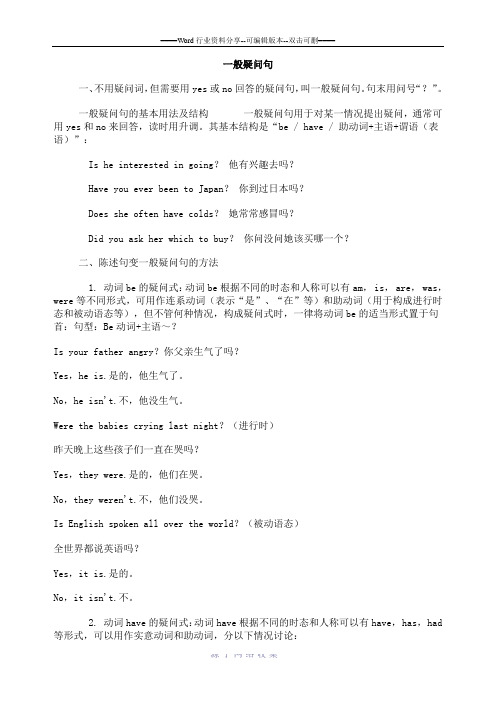
一般疑问句一、不用疑问词,但需要用yes或no回答的疑问句,叫一般疑问句。
句末用问号“?”。
一般疑问句的基本用法及结构一般疑问句用于对某一情况提出疑问,通常可用yes和no来回答,读时用升调。
其基本结构是“be / have / 助动词+主语+谓语(表语)”:Is he interested in going?他有兴趣去吗?Have you ever been to Japan?你到过日本吗?Does she often have colds?她常常感冒吗?Did you ask her which to buy?你问没问她该买哪一个?二、陈述句变一般疑问句的方法1. 动词be的疑问式:动词be根据不同的时态和人称可以有am, is, are, was,were等不同形式,可用作连系动词(表示“是”、“在”等)和助动词(用于构成进行时态和被动语态等),但不管何种情况,构成疑问式时,一律将动词be的适当形式置于句首:句型:Be动词+主语~?Is your father angry?你父亲生气了吗?Yes,he is.是的,他生气了。
No,he isn't.不,他没生气。
Were the babies crying last night?(进行时)昨天晚上这些孩子们一直在哭吗?Yes,they were.是的,他们在哭。
No,they weren't.不,他们没哭。
Is English spoken all over the world?(被动语态)全世界都说英语吗?Yes,it is.是的。
No,it isn't.不。
2. 动词have的疑问式:动词have根据不同的时态和人称可以有have, has, had 等形式,可以用作实意动词和助动词,分以下情况讨论:①用作实意动词表示状态,如表示拥有、患病或用于have to表示“必须”等,在构成构成式时可以直接将have, has, had置于句首,也可根据情况在句首使用do,does, did:Does he have [Has he] anything to say?他有什么话要说吗?Do you have [Have you] to leave so soon?你必须这么早走吗?Did you have [Had you] any friends then?他当时有朋友吗?②用作实意动词表示动作,如表示“吃(=eat)”、“喝(=drink)”、“拿(=take)”、“收到(=receive)”、“度过(=spend)”等,构成疑问式时不能将have提前至句首,而应在句首使用do, does, did:Does he have breakfast at home?他在家吃早餐吗?Did you have a good time at the party?你在晚会上玩得高兴吗?③完成时的一般疑问句句型:Have(Has)+主语+动词的过去分词+~?Have you known her since your childhood?你从童年就认识她吗?Yes,I have.是的。
小学英语肯定句、否定句、一般疑问句和特殊疑问句的详解

小学英语肯定句、否定句、一般疑问句和特殊疑问句的详解一、be动词:am, is, are二、肯定句、否定句、一般疑问句和特殊疑问句定义1.肯定句:表示肯定的意思, 即不含有否定词“不”。
比如:我是一个学生 I am a student.他去上学 He goes to school.2.否定句:表示否定的意思。
比如:我不是一个男孩。
I am not a boy他不去上学 He does not go to school.3. 一般疑问句:回答为“是yes”或者“否no”的问句。
非单三时用do, 单三时用does肯定句:I like English.否定句:单三肯定句:He likes English.like English?否定句:like English.3.动词过去式的句子分两类,was\were 和动词过去式有 was,were 改为否定句,直接在后面加 not ,改为一般疑问句把 was were 直接提前,有 I we 改为 youI was a teacher.I was not a teacher.(A.Morning !B.Hello !C.Hi !( )2. Nice to see you again ! .A.How are you ?B.Nice to see you , too .C.How do you do ?( )3.Good night,mom !A.Night !B.Good night !C.Good evening .( )4.How do you do ?A.How are you ?B.Fine,thanks .C.How do you do ?( )5.How many story books do you have ?((((( )10. ? Her name is Chen Jie.A.What’s your name ?B.What’s she name ?C.What’s her name ?( )11. ? I like Chinese,math and English.A.What classes do you like?B.What do you like?C.What are you like ?( )12. ? We have English and P.E.A.What do you have on Mondays ?B.What do you have ?C.What do you have on Monday?( )13. ? It’s Monday.((((A.hasB.amC.have( )18.What’s Chinese teacher like ?A.youB.yourC.you’re( )19.My P.E.teacher is thin.A.tooB.soC.very( )20.There are days in a week.A.sixB.sevenC.eight( )21.There are month(月)in a year(年).((((六年级英语测试题Class: Name:( )1. How are you ?A.Fine,thanks.B.Yes,it is.C.How are you ?( )2. Nice to meet you !A.Fine,thank you.B.OK.C.Nice to meet you ,too !( )3. How do you go to school ?A.I go to Canada by plane.B.I go to school by bike.C.What about you ?(( office. (((A.Next to the cinema.B.Thank you .C.You’re welcome.( )9. Excuse me ,is there a cinema near here ?A.Yes,there is .B.No,it’s not far.C.It’s near the post office.( )10.? ? It’s near the post office.A.Yes,there is .B.No,it’s not far.C. Where is the library?( )11. ? It’s next to the hospital.A. Where is the cinema ,please ?B.Is it far ?C.Go straight.( )12. How can I get to the hospital ?((((( )17. Is it far ?A.No,it is .B.Yes , it is .C.Yes,it isn’t. ( )18. do you go to school ?A.WhatB.WhereC.How( )19. I go to school bike.A.onB. byC.get( )20. Can I go foot ?A.byB.atC.on (((((A.WhereB.HowC.When四年级英语测试题Class: Name:( )1.Good afternoon !A.Hello!B.Hi !C.Afternoon !( )2.Nice to see you again !A.How are you ?B.Hello !C.Nice to see you , too.( )3.Good night,moom !A.Good evening !B.Good night !C.Night !( )4.How are you ?A.Fine,thank you .B.I am 10.C.Nine .( )5.How do you do ?A.Fine ,Thank you .B.How are you ?C.How do you do ?( )6.How old are you ?A.How are you ?B.I am 11.C.I have 11.( )7. ? I have 23.A.How many books do you have ?B.How many books can you see?C.How many book do you have ?( )8. ? I can see 6.A.How many lights do you have ?B.How many lights can you see ?C.How many light can you see ?( )21.There a bee in our classroom.A. isB.areC.am( )22. have a new schoolbag. schoolbag is heavy.A.I , myB.I ,MyC.My , I( )23.Put your English book your head.A.atB.inC.on( )24.There many books in the desk.A.amB.isC.are( )25.How many do you have ? A.pencil B.pencils C.pencils. 三年级英语测试题Class: Name:( )1.当向别人打招呼时,应该说:A.Hello.B.Good morning .( )2.How are you ? 的正确答语是:B.I’m fine,thank you .( )3.当想知道别人的名字时,应该说: A.What’s your name ? B.See you. ( )4.字母K的小写是:A.kB.( )5.Nice to meet you 的意思是:A.见到你很高兴。
小学英语必会基础知识--一般疑问句
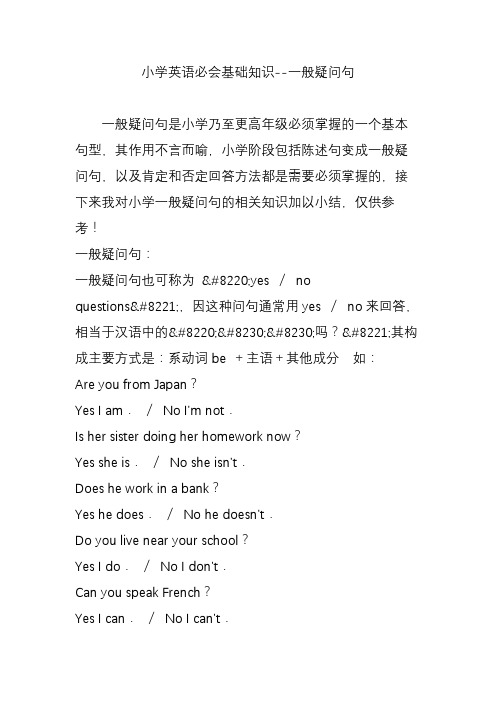
小学英语必会基础知识--一般疑问句一般疑问句是小学乃至更高年级必须掌握的一个基本句型,其作用不言而喻,小学阶段包括陈述句变成一般疑问句,以及肯定和否定回答方法都是需要必须掌握的,接下来我对小学一般疑问句的相关知识加以小结,仅供参考!一般疑问句:一般疑问句也可称为“yes /noquestions”,因这种问句通常用yes /no来回答,相当于汉语中的“……吗?”其构成主要方式是:系动词be +主语+其他成分如:Are you from Japan?Yes I am./No I'm not.Is her sister doing her homework now?Yes she is./No she isn't.Does he work in a bank?Yes he does./No he doesn't.Do you live near your school?Yes I do./No I don't.Can you speak French?Yes I can./No I can't.May I go home now?Yes you may./No you mustn't.1.将陈述句变为一般疑问句时,如句中有be 动词(am is are …)时,可直接将它们提至主语前。
如主语为第一人称,应将其改为第二人称。
例:I'm in Class 2Grade 1.→Are you in Class 2Grade 1?We're watching TV.→Are you watching TV?2.陈述句中有情态动词(can may must …)时,也可直接将它们提至主语前,即可成为一般疑问句。
小学一般疑问句
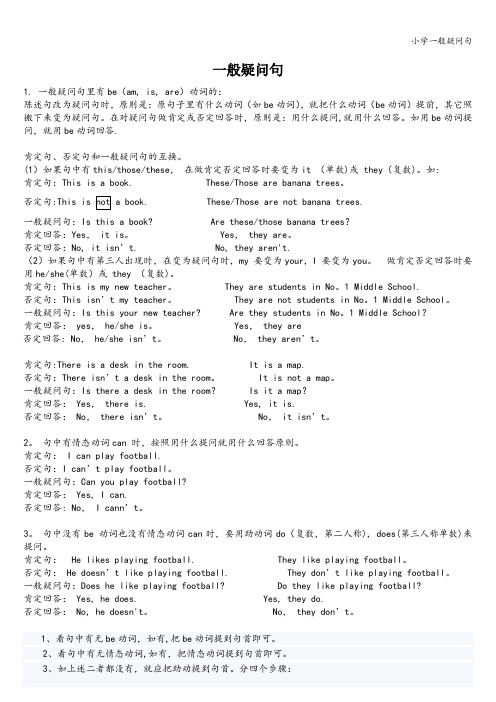
一般疑问句1. 一般疑问句里有be(am, is, are)动词的:陈述句改为疑问句时,原则是:原句子里有什么动词(如be动词),就把什么动词(be动词)提前,其它照搬下来变为疑问句。
在对疑问句做肯定或否定回答时,原则是:用什么提问,就用什么回答。
如用be动词提问,就用be动词回答.肯定句、否定句和一般疑问句的互换。
(1)如果句中有this/those/these,在做肯定否定回答时要变为it (单数)或 they(复数)。
如:肯定句:This is a book. These/Those are banana trees。
否定句一般疑问句:Is this a book? Are these/those banana trees?肯定回答:Yes, it is。
Yes, they are。
否定回答:No, it isn’t. No, they aren't.(2)如果句中有第三人出现时,在变为疑问句时,my 要变为your, I 要变为you。
做肯定否定回答时要用he/she(单数)或 they (复数)。
肯定句:This is my new teacher。
They are students in No。
1 Middle School.否定句:This is n’t my teacher。
They are not students in No。
1 Middle School。
一般疑问句:Is this your new teacher? Are they students in No。
1 Middle School?肯定回答: yes, he/she is。
Yes, they are否定回答: No,he/she isn’t。
No, they aren’t。
肯定句:There is a desk in the room. It is a map.否定句:There isn’t a desk in the room。
小学英语特殊疑问句和一般疑问句的归纳

特殊疑问句和一般疑问句的答法一般疑问句通常都是1..以be (am,is,are,)开头2.以Do,Does,Did 开头或以Can开头回答方法:前面用什么提问的就用什么答。
只有两种回答方式:1)肯定的,Yes,主语+ 提问词.2)否定的No,主语+提问词+not.【注意:问句与答句的第一二人称要互换】如:④主语是名字时的答语:看性别,男的用he ,女的用she ,其他的用it 复数就用they。
如:①Is she……? Is he………? Is it……..?Yes, she is.Yes, he is. Yes, it is.No, she isn,t. No, he isn,t. No, it isn,t.②Are they………? Are the monkeys …….?Yes, they are.Yes, they are.No,they aren’t No,they aren’t③Do they………?Does he……..? Did she…….?Yes,they do. Yes,he does. Yes, she did.No,they don’t. No,he doesn’t. No,she didn’t.④Are you……..?Are you……..? Do you…….?Yes, I am.Yes, we are. Yes ,I do. 或Yes,No, I am not. No, we aren’t. No,I don’t. 或No,⑤Does Mike…….? Is ChenJi…..? Do your parents…?Yes ,he does.Yes , she is. Yes, they do.No,he doesn’t. No, she isn’t. No,they don’t.一、专项练习。
1. Did ChenJie read books yesterday?2. Can the girl cook the meals ?—————————————————————————————3.Is he going to swim this afternoon?4. Are they going to take a trip next weend? ————————————————————————————————5.Does he often go to school by bike ? 6. Do you play basketball every weekend? ———————————————————————————————————7. Did Mike do his homework yesterday? 8. Are they playing basketball now?————————————————————————————————一般疑问句及特殊疑问句的总结一般疑问句的定义:用yes或no来回答的疑问句叫一般疑问句。
小学英语四种基本句型肯定句否定句、一般疑问句与特殊疑问句
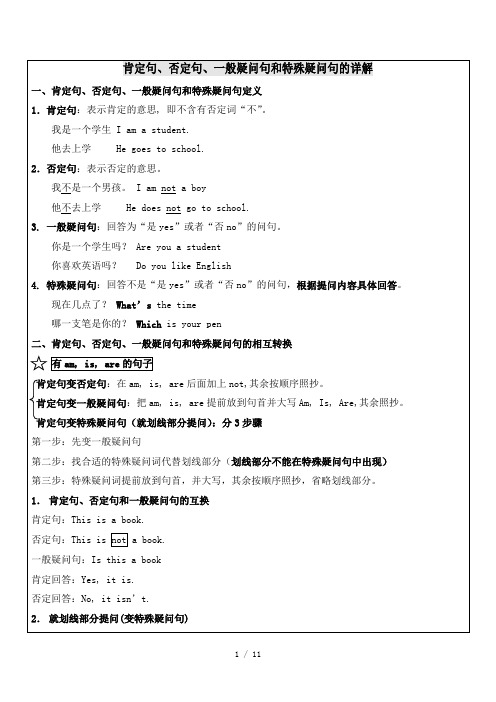
3、A: _______ is the diary???????????? B:It’s under the chair. 4、A: _______ is the Chirstmas Day???? B: It’s on the 25th of December. 5、A: _______ are the earphones????????B:They are 25 yuan. 6、A: _______ is the hairdryer??????????B:It’s blue. 7、A: _______ is it today??????????????B:It’s Sunday. 8、A: _______ was it yesterday???????? B: It was the 13th of October. 9、A: _______ this red one????????????B:It’s beautiful. 10、A: _______ is it from here???????? B:It’s about two kilometres away. 11、A: Can I have some paper and some crayons
常用特殊疑问词及词组:
when 什么时间(问时间)
what date 什么日期 问具体日期
who 谁(问人)
what place 什么地点问具体地址
whose 谁的 问主人
how …怎么样 问情况
2 / 11
where 在哪里 问地点 which 哪一个 问选择 why 为什么 问原因
how old 多大 问年龄 how many 多少 问数量 how much 多少 问价钱
1 / 11
一般疑问句小学英语练习题
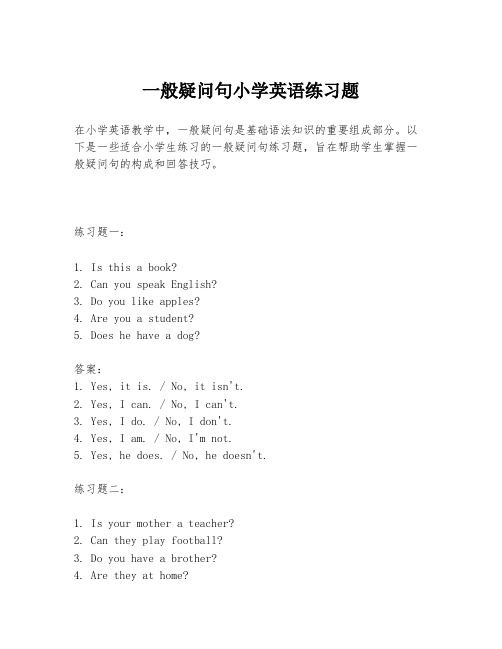
一般疑问句小学英语练习题在小学英语教学中,一般疑问句是基础语法知识的重要组成部分。
以下是一些适合小学生练习的一般疑问句练习题,旨在帮助学生掌握一般疑问句的构成和回答技巧。
练习题一:1. Is this a book?2. Can you speak English?3. Do you like apples?4. Are you a student?5. Does he have a dog?答案:1. Yes, it is. / No, it isn't.2. Yes, I can. / No, I can't.3. Yes, I do. / No, I don't.4. Yes, I am. / No, I'm not.5. Yes, he does. / No, he doesn't.练习题二:1. Is your mother a teacher?2. Can they play football?3. Do you have a brother?4. Are they at home?5. Does she live in China?答案:1. Yes, she is. / No, she isn't.2. Yes, they can. / No, they can't.3. Yes, I do. / No, I don't.4. Yes, they are. / No, they aren't.5. Yes, she does. / No, she doesn't. 练习题三:1. Is it raining?2. Can you swim?3. Do they have a cat?4. Are you hungry?5. Does he like music?答案:1. Yes, it is. / No, it isn't.2. Yes, I can. / No, I can't.3. Yes, they do. / No, they don't.4. Yes, I am. / No, I'm not.5. Yes, he does. / No, he doesn't. 练习题四:1. Is she your sister?2. Can he play the piano?3. Do you have a car?4. Are they in the classroom?5. Does she have long hair?答案:1. Yes, she is. / No, she isn't.2. Yes, he can. / No, he can't.3. Yes, I do. / No, I don't.4. Yes, they are. / No, they aren't.5. Yes, she does. / No, she doesn't.练习题五:1. Is he your friend?2. Can they dance?3. Do you like sports?4. Are you from Beijing?5. Does he have a bike?答案:1. Yes, he is. / No, he isn't.2. Yes, they can. / No, they can't.3. Yes, I do. / No, I don't.4. Yes, I am. / No, I'm not.5. Yes, he does. / No, he doesn't.通过这些练习题,学生可以加深对一般疑问句的理解,并且学会如何正确地构造和回答一般疑问句。
免费】小学三年级英语语法:一般疑问句及特殊疑问句

免费】小学三年级英语语法:一般疑问句及特殊疑问句小学三年级英语语法:一般疑问句及特殊疑问句一般疑问句及特殊疑问句句子基本是:简单陈述句,由简单陈述句转变成肯定句,否定句,疑问句。
疑问句是用来提出问题。
英语中有四种疑问句:一般疑问句、特殊疑问句、选择疑问句和反意疑问句。
我们现在已经接触到了前两种疑问句。
后两种疑问句以后我们还会学到.一、一般疑问句:英语中要用yes和no来回答的疑问句叫一般疑问句。
如:(1)Is it hot。
Yes。
it is。
\No。
it isn't.-- be动词引导2)Is it a car。
Yes。
it is。
\No。
it isn't。
-- be动词引导3)Isthisyourruler?Yes,itis.\No,itisn't.--be动词引导4)Do you like bananas。
--含实义动词Yes。
I like bananas。
\ No。
I don't like bananas.(5)Can Ming hear a drill。
--含情态动词Yes。
Ming can hear a drill.\No,Ming can't hear a drill.陈述句(肯定句,否定句,一般疑问句)的转变规律:1.肯定句:2.否定句:3.一般疑问句及肯否定回答主语+be动词+….主语+be动词+not+….be动词+主语+…?Yes,主语+be动词./No,主语+be动词+not.I am XXX?Yes。
I am./ No。
I am not. XXX?Yes。
she is./ No。
she isn't. XXX insects?Yes。
they are./ No。
they aren't. 主语+神态动词can+…主语+情态动词can+ no t+….神态动词can+主语+…?Yes,主语+神态动词can/No,主语+情态动词can+ not He can jump.Hecannot/can'tjump.Can he jump?Yes,he can./ No。
小学一般疑问句练习题

小学一般疑问句练习题01. What is your name?My name is Sara.02. Are you a student?Yes, I am a student.03. Can you swim?No, I can't swim.04. Does she like ice cream?Yes, she likes ice cream.05. Is it raining outside?No, it is not raining outside.06. Are they brothers?Yes, they are brothers.07. Did you eat breakfast?Yes, I ate breakfast.08. Is he playing soccer?No, he is not playing soccer.09. Do you have a pet?Yes, I have a pet.10. Are you going to the park?No, I am not going to the park. 11. Did you see the movie?Yes, I saw the movie.12. Is it your birthday today?No, it is not my birthday today. 13. Can you speak French?Yes, I can speak French.14. Is she coming to the party?No, she is not coming to the party.15. Do they have any books?Yes, they have many books. 16. Is he a doctor?No, he is not a doctor.17. Did you go to the zoo?Yes, I went to the zoo.18. Are you wearing a hat?No, I am not wearing a hat.19. Can you play the piano?Yes, I can play the piano.20. Is it snowing?No, it is not snowing.21. Did they finish their homework? Yes, they finished their homework.22. Is she wearing a blue dress?No, she is not wearing a blue dress.23. Do you like pizza?Yes, I like pizza.24. Are you going to the party?No, I am not going to the party. 25. Can you ride a bike?Yes, I can ride a bike.26. Is it your favorite color?No, it is not my favorite color. 27. Did you visit your grandparents? Yes, I visited my grandparents. 28. Is he watching TV?No, he is not watching TV.29. Do you have any siblings?Yes, I have two siblings.30. Are you going to the beach?No, I am not going to the beach.这是一些小学生常见的一般疑问句练习题,通过回答这些问题,可以帮助学生熟悉并练习运用疑问句的语法结构和语调。
小学英语一般疑问句

2 情态动词: can, may,will,must ,shall,should,could, might, would,need, …
3 助动词: do does did has/have(已经)
注意: some在否定句, 疑问句中 要变成 any
3. Did Amy visit her grandparents last weekend?
○ No, _____ _____.
4. .Does she work at night?
○ No, ______ ______.
5. Does it warm in spring?
○ Yes, ______ _____.
一般疑问句常用Yes或No回答.(完整形式 )
肯定回答:
Yes,主语+be (情态动词、助动词)
否定回答:
No,主语+be (情态动词、助动词)+ not.
•
缩写 n’t 或 ’t
(1) Are you Tutu?
Is he your brothert?
Yes, I am.
Yes,he is.
No, I'm not.
添加标题
Tom is at home.(改一般疑问 句并做否定回答)
添加标题
I will go to Beijing next week.改一般疑问句 并做否定回答)
添加标题
Amy and Mike can dance.(改一般疑问 句并做肯定回答)
添加标题
Sarha comes from the USA.改一般疑问句 并肯定回答)
以情态动词 (can, may ) 开头的一般疑问句。
小学英语四种基本句型肯定句否定句、一般疑问句与特殊疑问句
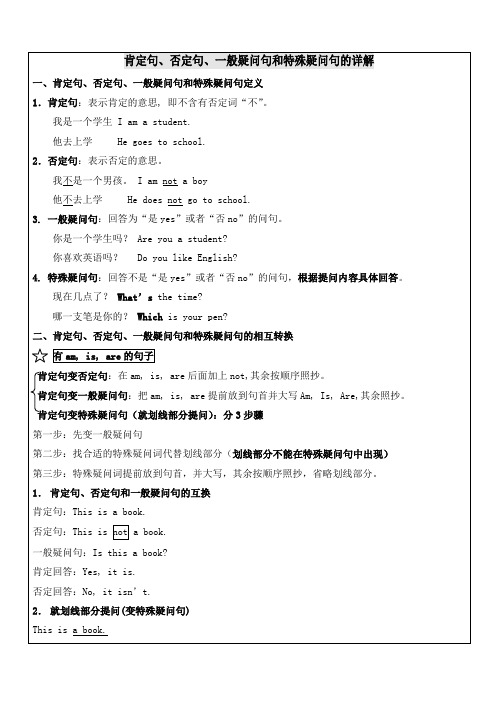
1.some 变为 any There are some birds in the tree.→There aren't any birds in the tree. 但是,若在表示请邀请、请求的句子中,some 可以不变。 Would you like some orange juice? 与此相关的一些不定代词如 something, somebody 等也要进行相应变化。
第一步:变一般疑问句 Is this a book?
第二步:找合适的特殊疑问词 Is this what ?
第三步:特殊疑问词提前放到句首,并大写,其余按顺序照抄,省略划线部分。What is this?
没有 am, is, are 的句子
肯定句变否定句:在主语后面加上 do not 或者 does not,其余按顺序照抄动词用原形
练一练 1 (用特殊疑问词填空): 1、A: _______ is the boy in blue?????????B:He’s Mike. 2、A: _______ wallet is it????????????? B:It’s mine. 3、A: _______ is the diary????????????? B:It’s under the chair.
what day 星期几 问星期
How often 多久 问频率
三.句子的种类
类别 陈述句
疑问句
用法 肯定 叙述一件事情或
说明说话人的看法
否定
标点 .
一般 用于提出问题
?
特殊 用于提出问题
?
例句 This is a bag. That's my book. I can see a bag over there. I don't know. Are you a student? Do you like puppets? Can you speak English? What's your name? Where's my bag? How many trees are there?
小学英语四种基本句型-肯定句、否定句、一般疑问句及特殊疑问句
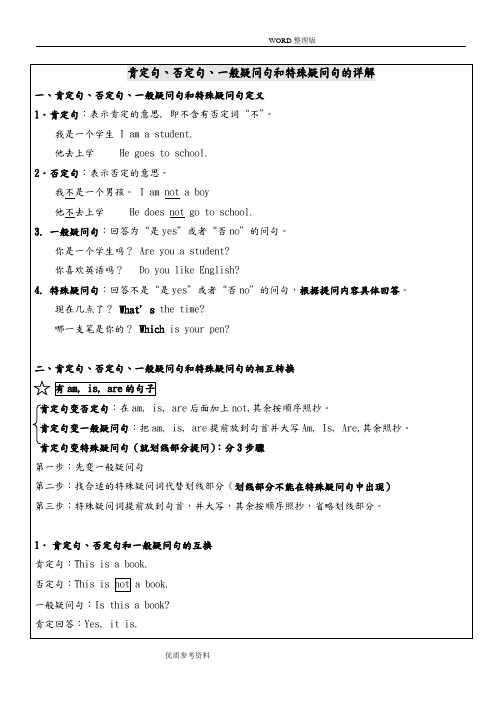
1.肯定句、否定句和一般疑问句的互换 非单三时用 do, 单三时用 does 非单三 肯定句:I like English.
一般疑问句:Do you like English? 否定句:I do not like English. 单三 肯定句:He likes English. 一般疑问句:Does he like English? 否定句:He does not like English.
why 为什么 问原因
how much 多少 问价钱
what 什么 问东西
how about …怎么样 问意见
what time 什么时间 问时间 how far 多远 问路程 what colour 什么颜色 问颜色 how long 多长 问时间
what about…怎么样 问意见 How soon 多快,多久 问时间
2.就划线部分提问(变特殊疑问句) I like English. 第一步:先变一般疑问句 Do you like English? 第二步:找合适的特殊疑问词代替划线部分 Do you like what? 第三步:特殊疑问词提前放到句首,并大写,其余按顺序照抄,省略划线部分。
优质参考资料
What do you like? 常用特殊疑问词及词组:
2、A: _______ wallet is it?
B:ห้องสมุดไป่ตู้t’s mine.
3、A: _______ is the diary?
B:It’s under the chair.
4、A: _______ is the Chirstmas Day?
B: It’s on the 25th of December.
14、A:_______ do you have dinner? B: At 6 o’clock
小学英语四种基本句型-肯定句、否定句、一般疑问句及特殊疑问句
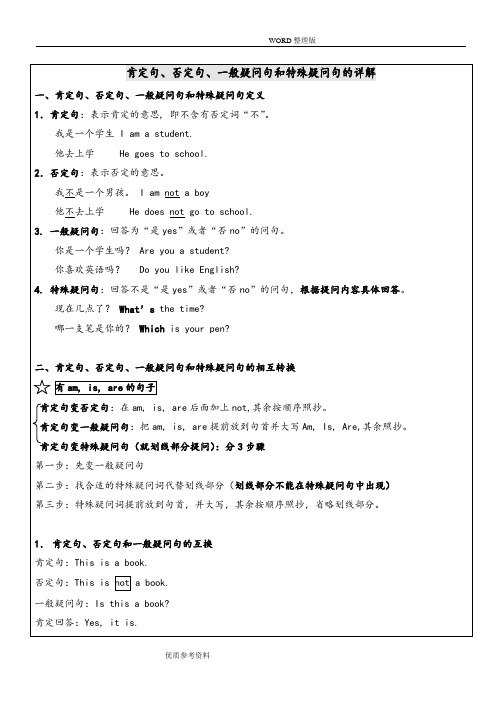
WORD 整理版
常用特殊疑问词及词组:
when 什么时间(问时间)
what date 什么日期 问具体日期
who 谁(问人)
what place 什么地点问具体地址
whose 谁的 问主人
how …怎么样 问情况
where 在哪里 问地点
how old 多大 问年龄
which 哪一个 问选择
how many 多少 问数量
I have been there already.→I haven't been there yet.
熟记变特殊疑问句时,容易判断错的情况。 1、 数词
表示年龄:He is fifty-five. How old is he ? 表示时间:It’s fifty-five. What’s the time? 表示加法:Six and two is eight. What’s six and two? 表示价格:The shirt is thirty yuan . How much is the shirt? 表示多少:I have three brothers. How many brothers do you have? 2、 姓名和人 表示人名:My name is Gina. What’s your name? 表示人:The woman is Gina. Who is the woman ? 3、 长度和距离 表示距离:It’s five hundred metres away from here. How far is it from here? 表示长度:It’s five hundred metres. How long is it ?
B: _______ ?
A: I want to make a kite.
小学英语疑问句
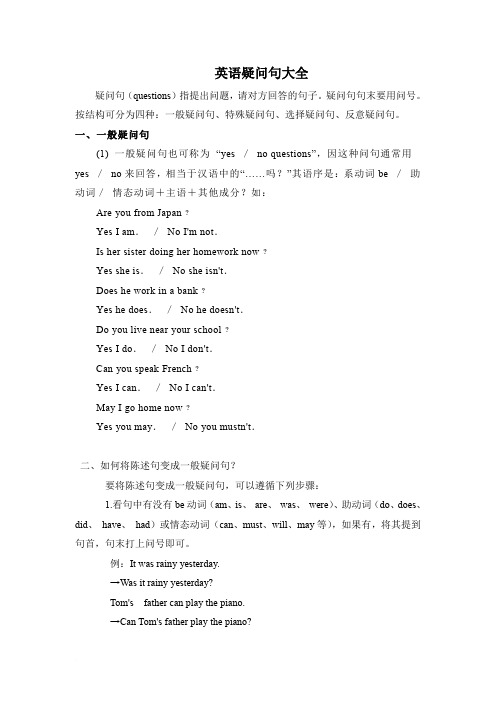
英语疑问句大全疑问句(questions)指提出问题,请对方回答的句子。
疑问句句末要用问号。
按结构可分为四种:一般疑问句、特殊疑问句、选择疑问句、反意疑问句。
一、一般疑问句(1) 一般疑问句也可称为“yes /no questions”,因这种问句通常用yes /no来回答,相当于汉语中的“……吗?”其语序是:系动词be /助动词/情态动词+主语+其他成分?如:Are you from Japan﹖Yes I am./No I'm not.Is her sister doing her homework now﹖Yes she is./No she isn't.Does he work in a bank﹖Yes he does./No he doesn't.Do you live near your school﹖Yes I do./No I don't.Can you speak French﹖Yes I can./No I can't.May I go home now﹖Yes you may./No you mustn't.二、如何将陈述句变成一般疑问句?要将陈述句变成一般疑问句,可以遵循下列步骤:1.看句中有没有be动词(am、is、are、was、were)、助动词(do、does、did、have、had)或情态动词(can、must、will、may等),如果有,将其提到句首,句末打上问号即可。
例:It was rainy yesterday.→Was it rainy yesterday?Tom's father can play the piano.→Can Tom's father play the piano?I have finished my homework.→Have you finished your homework?2.如果句中没有be动词、助动词或情态动词,则根据谓语动词的形式借助do的相应形式放在句首。
小学英语一般疑问句和特殊疑问句总结

小学英语一般疑问句和特殊疑问句总结小学语法之疑问句一、一般疑问句一般疑问句是指可以用Yes或No作答的疑问句。
这种疑问句通常以be动词、助动词或情态动词开头,句末读升调。
肯定陈述句可以通过两种方式变成一般疑问句。
首先,如果原句中有be动词或情态动词,将其提到句首,句末加问号即可。
其次,如果原句中没有be动词或情态动词,需要在主语前加助动词(一般现在时do、does、一般过去时did),并将谓语动词变回原形。
需要注意的是,如果陈述句中有第一人称,则变问句时要变为第二人称。
另外,如果陈述句中有some,则变问句时往往要变成any。
一般疑问句的回答可以用Yes或No,并在主语后加上相应的be动词、助动词或情态动词。
如果回答是否定的,则需要在be动词、助动词或情态动词后面加上not的否定形式缩写。
Can she dance。
Yes。
she can.When asked if she can dance。
XXX。
If the subject of the n is "this" or "that"。
the answer should use "it" instead。
If the subject is "these" or "those"。
the answer should use "they" instead.Is this your bag?Yes。
it is。
/ No。
it isn't.Are those your books?Yes。
they are。
/ No。
they aren't.Practice:1.What did his father do for a living?2.Why are these cats crying?3.Who can swim?4.How did you go to school?5.How does his XXX work?6.Can Mrs。
小学英语语法知识讲解一般疑问句的讲解

一般疑问句的讲解及练习一、什么是一般疑问句?以Be动词〔am is are〕,助动词〔do / does/ did / have/has〕,情态动词〔can/must/should〕开头的句子,而且用Yes或No来答复,读升调的句子就是一般疑问句。
译成汉语,都可以带上“吗〞,例如上面三句可分别译为:例:1〕Is your father a teacher? 你父亲是老师吗?2〕Catherine like animals? 凯瑟琳喜欢动物吗?3〕Jenny speak French? 詹妮会说法语吗?二、由陈述句变一般疑问句的规则:①第一步“找〞,看看句中有没有be动词〔am/is/are〕,助动词〔do/does/have/has〕,情态动词〔can/must/should〕这些词,如果有,就直接将这些词放在句子的开头,句末打上问号。
1〕找be动词〔am/is/are〕,如果有be动词,就把be 动词提到句子的第一位,其它局部照抄,把最后的句号变成问号。
②注意人称的变化:一变二,二变一,三不变,some变成any把句子的“我I〞换成〞你’you“我们we换成你们you我的my换成你们your我们的our换成你们的your〞some变成any③注意第一个首字母要大写,句子末尾的“句号.〞换成“问号?〞■由be动词引导的一般疑问句Be(am/is/are)+主语+其它+?肯定答复:Yes,主语代词+Be动词+句号否认答复:No,主语代词+be动词+not.例如:It is rainy today.→Is it rainy today?■由情态动词引导的一般疑问句:情态动词+主语+动词原形+其它+?〔1〕肯定答复:Yes,主语代词+情态动词+句点〔2〕否认答复:No,主语代词+情态动词+ not . 口诀:一提二换三照抄一提:将情态动词提到句子开头;二换:将第一人称换成第二人称;三照抄:陈述句剩下的都照抄例句:①Can you swim?Yes, I cna./No, I can not. ②Should I walk in the road?No, you should not.③We can playfootball.变成一般疑问句:Can you play football?④Tom's father can play the piano.→Can Tom's father play the piano?■如果句中有没有be动词〔am is are〕,助动词〔do does have has〕,情态动词〔can〕,则依据谓语动词的形式借助do 或does放句首。
- 1、下载文档前请自行甄别文档内容的完整性,平台不提供额外的编辑、内容补充、找答案等附加服务。
- 2、"仅部分预览"的文档,不可在线预览部分如存在完整性等问题,可反馈申请退款(可完整预览的文档不适用该条件!)。
- 3、如文档侵犯您的权益,请联系客服反馈,我们会尽快为您处理(人工客服工作时间:9:00-18:30)。
一般疑问句一、什么是一般疑问句1、用Yes或No作答的疑问句叫一般疑问句。
2、译成汉语,都可以带上“吗”,例如:你父亲是老师吗?凯瑟琳喜欢动物吗?詹妮会说法语吗?二、例何将陈述句变成一般疑问句?要将陈述句变成一般疑问句,可以遵循下列步骤:1句中有没有be动词(am、is、 are、 was、 were)、情态动词(can、must、will、may等),如果有,将其提到句首即可。
It was rainy yesterday.Was it rainy yesterday?Tom's father can play the piano.Can Tom's father play the piano?She is a student.Is she a student?2. 如果句中没有be动词、情态动词,则根据谓语动词的形式借助do的相应形式放在句首。
They go to school by bike. (动词原形)Do they go to school by bike?Bill gets up at 6:30 every day. (第三人称单数)Does bill gets up at 6:30 every day?The students saw a film yesterday. (过去式)Did the students see a film yesterday?三.陈述句变一般疑问句应注意的事项1.如果陈述句中有第一人称,则变问句时最好要变为第二人称。
I usually have lunch at school.Do you usually have lunch at school?2.如果陈述句中有some, 则变否定句或者疑问句时往往要变成any 。
There is some water on the playground.Is there any water on the playground?四.一般疑问句的回答一般疑问句往往采用简短回答,共由三部分(三个单词)组成:1.第一个词:不是Yes就是No。
2.第二个词:问谁答谁。
即答语中的主语须与问句的主语一致Does she clean her room every day?Yes, she does.Is Anna′s father a doctor?No,he isn′t.3.第三个词:用什么问,用什么答。
即沿用问句中的引导词。
Can Jim play soccer?Yes, he can.Does Mr Bean speak English?Yes, he does.4.用No开头作否定回答时,结尾要加上 not。
例:Did Thomas come here yesterday?No ,he didn′tIs Lin Lin in Class 3?No, she isn′t.或(No, she′s not)特殊疑问句以疑问词开头,对句中某一成分提问的句子叫特殊疑问句。
特殊疑问句=特殊疑问词+一般疑问句常用的疑问词有:如何把陈述句变成特殊疑问句?就划线部分提问:肯定句变特殊疑问句(就划线部分提问):分3步骤第一步:先变一般疑问句第二步:找合适的特殊疑问词代替划线部分第三步:特殊疑问词提前放到句首,并大写,其余按顺序照抄,省略划线部分。
例子:特殊疑问句的回答:回答特殊疑问句时,不能用yes / no,即问什么答什么,尤其是简略回答。
如:Who is from Canada﹖(who问谁)Helen (is).Where's the restaurant﹖(where问地点)Near the station.Why do you like koalas﹖(why问原因)Because they are cute.一般疑问句&特殊疑问句练习一、将以下句子改为一般疑问句.1. His father is an English teacher.2. These cats are crying.3. They can swim.4. I like to read English.5. I go to school on foot.6. He likes English.7. His father goes to work by bus.8. He is crying under the tree.9. His birthday is on the twentieth of November.10. Mrs. Li and Kitty are in a big shop.11. Kitty is wearing her new uniform.12. The boy under the tree is hungry.13. He goes to school every day.15. I want to have a model car.16. She wants a cup of coffee.17. Mrs. Li and Kitty watch television at night.18. I do my homework after school二、选择正确的单词填空(who, where, when)1._____ is that pretty girl? She is my sister.2._____ are Jack and Tom? They are behind you.3._____ do you go to school? I go to school from Monday to Friday.4._____ has a beautiful flower? John has a beautiful flower.5._____ are they? They are my parents.6._____ is my mother? She is in the living room.7._____ are you going? We are going to the bakery(面包坊).8._____ do Jim and Wendy play ball? They play ball in the afternoon.9._____ does he jog? He jogs in the park.10._____ are you from? I'm from Changchun city.三、就画线部分提问1.He is my father.2.They are under the tree.3.I often watch TV after dinner.(晚饭后) 提示:饭后强调的是时间问题。
4.Lily swims in the swimming pool.(游泳池)5.Superman flies in the sky.6.I often brush my teeth in the evening.7.Alan likes to play with Bill.8.Joe's father plays badminton(羽毛球) every weekend.9.The supermarket is near the school.10.The laptop(笔记本电脑) is on the table.11.Jennifer has a pair of earrings(耳环).12.The flowers are in the flower pot(花盆).13.My grandpa took us to the zoo.14.I put the gold fish(金鱼) into the fish tank(鱼缸).15.The monkey sleeps at night.四.用what time, what color, what day, what填空。
1. A: ______ _______ is it? B: It is nine o’clock.2. A: ______ _______ does your mother get up? B: My mother gets up at 6:30.3. A: ______ _______ do you go to bed? B: I go to bed at 10:00.4. A: ______ _______ do Diana and Fiona have supper?B: Diana and Fiona have supper at 18:00.5. A: ______ _______is it? B: It is purple.6. A: ______ _______ is the sky? B: The sky is blue.7. A: ______ _______ is your coat? B: My coat is black.8. A: ______ _______ is the dog? B: The dog is white.9. A: ______ _______ is today? B: Today is Monday.10. A: ______ _______ is tomorrow? B: Tomorrow is Tuesday.11. A: ______ _______ was yesterday(昨天)? B: Yesterday was Sunday.12. A: ______ _______ do you like? B: I like red.13. A: ______ is this? This is a computer(电脑).14. A: ______ are you doing? B: We are playing basketball.15. A: ______ does your mother do? B: My mother is a policewoman.16. A: ______ are those? B: Those are peppers(辣椒).17. A: ______ is in the box? B: A lovely doll is in the box.18. A: ______ is on the table? B: The apple is on the table.19. A: ______ is in the classroom? The blackboard is in the classroom.20. A: ______ ______ ______? B: Mary is hungry.五.连线:(Match)1. What’s on the chair? A There is a book in the bag.2. How is your father? B These are apples.3. What are these? C I go to school by bus.4. What is in the bag? D The radio is on the chair.5. How do you go to school? E My father is fine.6. How much is it? F I wash my face in the morning.7. What time is it? G I have two hands.8. When do you wash your face? H It is four o’clock.9. How many hands do you have? I It is 5 RMB(人民币).10.When do you have lunch? J I have lunch at noon.课后练习:一.把以下句子改成一般疑问句1. His father was an English teacher.2. These cats are crying.3. They can swim.4. I went to school on foot.5. His father goes to work by bus.6. Mrs. Li and Kitty can sing English songs..7. Kitty is wearing her new uniform.8. The two boys under the tree were hungry.9. Mrs. Li and Kitty watch television at night.10. I can finish my homework by myself.11. I have some good friends.12. They cleaned their rooms and finished their homework yesterday.。
